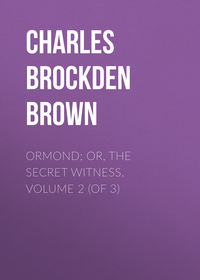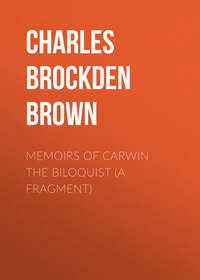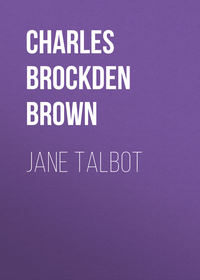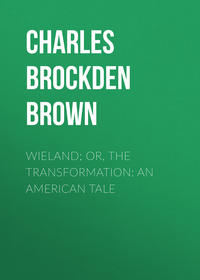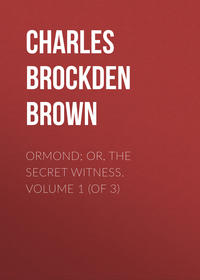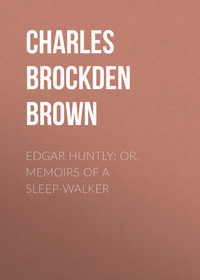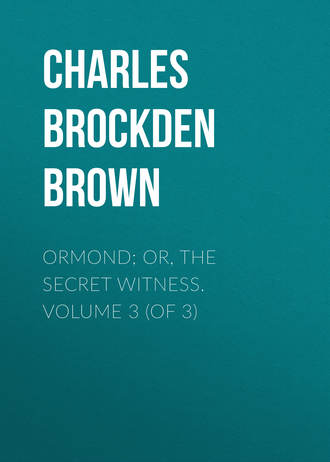 полная версия
полная версияOrmond; Or, The Secret Witness. Volume 3 (of 3)
These thoughts gave place to doubt and apprehension. I began to distrust the efficacy of my arguments, and to invent a thousand reasons, inducing her, in defiance of my rhetoric, at least to protract her absence. These reasons I had not previously conceived, and had not, therefore, attempted, in my letter, to invalidate their force. This omission was possible to be supplied in a second epistle; but, meanwhile, time would be lost, and my new arguments might, like the old, fail to convince her. At least, the tongue was a much more versatile and powerful advocate than the pen; and, by hastening to her habitation, I might either compel her to return with me, or ward off danger by my presence, or share it with her. I finally resolved to join her by the speediest conveyance.
This resolution was suggested by the meditations of a sleepless night. I rose with the dawn, and sought out the means of transporting myself, with most celerity, to the abode of my friend. A stage-boat, accustomed twice a day to cross New York Bay to Staten Island, was prevailed upon, by liberal offers, to set out upon the voyage at the dawn of day. The sky was gloomy, and the air boisterous and unsettled. The wind, suddenly becoming tempestuous and adverse, rendered the voyage at once tedious and full of peril. A voyage of nine miles was not effected in less than eight hours and without imminent and hairbreadth danger of being drowned.
Fifteen miles of the journey remained to be performed by land. A carriage, with the utmost difficulty, was procured, but lank horses and a crazy vehicle were but little in unison with my impatience. We reached not Amboy ferry till some hours after nightfall. I was rowed across the Sound, and proceeded to accomplish the remainder of my journey – about three miles – on foot.
I was actuated to this speed by indefinite but powerful motives. The belief that my speedy arrival was essential to the rescue of my friend from some inexplicable injury haunted me with ceaseless importunity. On no account would I have consented to postpone this precipitate expedition till the morrow.
I at length arrived at Dudley's farm-house. The inhabitants were struck with wonder at the sight of me. My clothes were stained by the water by which every passenger was copiously sprinkled during our boisterous navigation, and soiled by dust; my frame was almost overpowered by fatigue and abstinence.
To my anxious inquiries respecting my friend, they told me that her evenings were usually spent at the mansion, where it was probable she was now to be found. They were not apprized of any inconvenience or danger that betided her. It was her custom sometimes to prolong her absence till midnight.
I could not applaud the discretion nor censure the temerity of this proceeding. My mind was harassed by unintelligible omens and self-confuted fears. To obviate the danger and to banish my inquietudes was my first duty. For this end I hastened to the mansion. Having passed the intervening hillocks and copses, I gained a view of the front of the building. My heart suddenly sunk, on observing that no apartment – not even that in which I knew it was her custom to sit at these unseasonable hours – was illuminated. A gleam from the window of the study I should have regarded as an argument at once of her presence and her safety.
I approached the house with misgiving and faltering steps. The gate leading into a spacious court was open. A sound on one side attracted my attention. In the present state of my thoughts, any near or unexplained sound sufficed to startle me. Looking towards the quarter whence my panic was excited, I espied, through the dusk, a horse grazing, with his bridle thrown over his neck.
This appearance was a new source of perplexity and alarm. The inference was unavoidable that a visitant was here. Who that visitant was, and how he was now employed, was a subject of eager but fruitless curiosity. Within and around the mansion, all was buried in the deepest repose. I now approached the principal door, and, looking through the keyhole, perceived a lamp, standing on the lowest step of the staircase. It shed a pale light over the lofty ceiling and marble balustrades. No face or movement of a human being was perceptible.
These tokens assured me that some one was within: they also accounted for the non-appearance of light at the window above. I withdrew my eye from this avenue, and was preparing to knock loudly for admission, when my attention was awakened by some one who advanced to the door from the inside and seemed busily engaged in unlocking. I started back and waited with impatience till the door should open and the person issue forth.
Presently I heard a voice within exclaim, in accents of mingled terror and grief, "Oh, what – what will become of me? Shall I never be released from this detested prison?"
The voice was that of Constantia. It penetrated to my heart like an icebolt. I once more darted a glance through the crevice. A figure, with difficulty recognised to be that of my friend, now appeared in sight. Her hands were clasped on her breast, her eyes wildly fixed upon the ceiling and streaming with tears, and her hair unbound and falling confusedly over her bosom and neck.
My sensations scarcely permitted me to call, "Constantia! For Heaven's sake, what has happened to you? Open the door, I beseech you."
"What voice is that? Sophia Courtland! O my friend! I am imprisoned! Some demon has barred the door, beyond my power to unfasten. Ah, why comest thou so late? Thy succour would have somewhat profited if sooner given; but now, the lost Constantia – " Here her voice sunk into convulsive sobs.
In the midst of my own despair, on perceiving the fulfilment of my apprehensions, and what I regarded as the fatal execution of some project of Ormond, I was not insensible to the suggestions of prudence. I entreated my friend to retain her courage, while I flew to Laffert's and returned with suitable assistance to burst open the door.
The people of the farm-house readily obeyed my summons. Accompanied by three men of powerful sinews, sons and servants of the farmer, I returned with the utmost expedition to the mansion. The lamp still remained in its former place, but our loudest calls were unanswered. The silence was uninterrupted and profound.
The door yielded to strenuous and repeated efforts, and I rushed into the hall. The first object that met my sight was my friend, stretched upon the floor, pale and motionless, supine, and with all the tokens of death.
From this object my attention was speedily attracted by two figures, breathless and supine like that of Constantia. One of them was Ormond. A smile of disdain still sat upon his features. The wound by which he fell was secret, and was scarcely betrayed by the effusion of a drop of blood. The face of the third victim was familiar to my early days. It was that of the impostor whose artifice had torn from Mr. Dudley his peace and fortune.
An explication of this scene was hopeless. By what disastrous and inscrutable fate a place like this became the scene of such complicated havoc, to whom Craig was indebted for his death, what evil had been meditated or inflicted by Ormond, and by what means his project had arrived at this bloody consummation, were topics of wild and fearful conjecture.
But my friend – the first impulse of my fears was to regard her as dead. Hope and a closer observation outrooted, or, at least, suspended, this opinion. One of the men lifted her in his arms. No trace of blood or mark of fatal violence was discoverable, and the effusion of cold water restored her, though slowly, to life.
To withdraw her from this spectacle of death was my first care. She suffered herself to be led to the farm-house. She was carried to her chamber. For a time she appeared incapable of recollection. She grasped my hand, as I sat by her bedside, but scarcely gave any other tokens of life.
From this state of inactivity she gradually recovered. I was actuated by a thousand forebodings, but refrained from molesting her by interrogation or condolence. I watched by her side in silence, but was eager to collect from her own lips an account of this mysterious transaction.
At length she opened her eyes, and appeared to recollect her present situation, and the events which led to it. I inquired into her condition, and asked if there were any thing in my power to procure or perform for her.
"Oh, my friend," she answered, "what have I done, what have I suffered, within the last dreadful hour! The remembrance, though insupportable, will never leave me. You can do nothing for my relief. All I claim is your compassion and your sympathy."
"I hope," said I, "that nothing has happened to load you with guilt or with shame?"
"Alas! I know not. My deed was scarcely the fruit of intention. It was suggested by a momentary frenzy. I saw no other means of escaping from vileness and pollution. I was menaced with an evil worse than death. I forebore till my strength was almost subdued: the lapse of another moment would have placed me beyond hope.
"My stroke was desperate and at random. It answered my purpose too well. He cast at me a look of terrible upbraiding, but spoke not. His heart was pierced, and he sunk, as if struck by lightning, at my feet. O much erring and unhappy Ormond! That thou shouldst thus untimely perish! That I should be thy executioner!"
These words sufficiently explained the scene that I had witnessed. The violence of Ormond had been repulsed by equal violence. His foul attempts had been prevented by his death. Not to deplore the necessity which had produced this act was impossible; but, since this necessity existed, it was surely not a deed to be thought upon with lasting horror, or to be allowed to generate remorse.
In consequence of this catastrophe, arduous duties had devolved upon me. The people that surrounded me were powerless with terror. Their ignorance and cowardice left them at a loss how to act in this emergency. They besought my direction, and willingly performed whatever I thought proper to enjoin upon them.
No deliberation was necessary to acquaint me with my duty. Laffert was despatched to the nearest magistrate with a letter, in which his immediate presence was entreated and these transactions were briefly explained. Early the next day the formalities of justice, in the inspection of the bodies and the examination of witnesses, were executed. It would be needless to dwell on the particulars of this catastrophe. A sufficient explanation has been given of the causes that led to it. They were such as exempted my friend from legal animadversion. Her act was prompted by motives which every scheme of jurisprudence known in the world not only exculpates, but applauds. To state these motives before a tribunal hastily formed and exercising its functions on the spot was a task not to be avoided, though infinitely painful. Remonstrances the most urgent and pathetic could scarcely conquer her reluctance.
This task, however, was easy, in comparison with that which remained. To restore health and equanimity to my friend; to repel the erroneous accusations of her conscience; to hinder her from musing, with eternal anguish, upon this catastrophe; to lay the spirit of secret upbraiding by which she was incessantly tormented, which bereft her of repose, empoisoned all her enjoyments, and menaced not only the subversion of her peace but the speedy destruction of her life, became my next employment.
My counsels and remonstrances were not wholly inefficacious. They afforded me the prospect of her ultimate restoration to tranquillity. Meanwhile, I called to my aid the influence of time and of a change of scene. I hastened to embark with her for Europe. Our voyage was tempestuous and dangerous, but storms and perils at length gave way to security and repose.
Before our voyage was commenced, I endeavoured to procure tidings of the true condition and designs of Ormond. My information extended no further than that he had put his American property into the hands of Mr. Melbourne, and was preparing to embark for France. Courtland, who has since been at Paris, and who, while there, became confidentially acquainted with Martinette de Beauvais, has communicated facts of an unexpected nature.
At the period of Ormond's return to Philadelphia, at which his last interview with Constantia in that city took place, he visited Martinette. He avowed himself to be her brother, and supported his pretensions by relating the incidents of his early life. A separation at the age of fifteen, and which had lasted for the same number of years, may be supposed to have considerably changed the countenance and figure she had formerly known. His relationship was chiefly proved by the enumeration of incidents of which her brother only could be apprized.
He possessed a minute acquaintance with her own adventures, but concealed from her the means by which he had procured the knowledge. He had rarely and imperfectly alluded to his own opinions and projects, and had maintained an invariable silence on the subject of his connection with Constantia and Helena. Being informed of her intention to return to France, he readily complied with her request to accompany her in this voyage. His intentions in this respect were frustrated by the dreadful catastrophe that has been just related. Respecting this event, Martinette had collected only vague and perplexing information. Courtland, though able to remove her doubts, thought proper to withhold from her the knowledge he possessed.
Since her arrival in England, the life of my friend has experienced little variation. Of her personal deportment and domestic habits you have been a witness. These, therefore, it would be needless for me to exhibit. It is sufficient to have related events which the recentness of your intercourse with her hindered you from knowing but by means of some formal narrative like the present. She and her friend only were able to impart to you the knowledge which you have so anxiously sought. In consideration of your merits and of your attachment to my friend, I have consented to devote my leisure to this task.
It is now finished; and I have only to add my wishes that the perusal of this tale may afford you as much instruction as the contemplation of the sufferings and vicissitudes of Constantia Dudley has afforded to me. Farewell.
THE END

